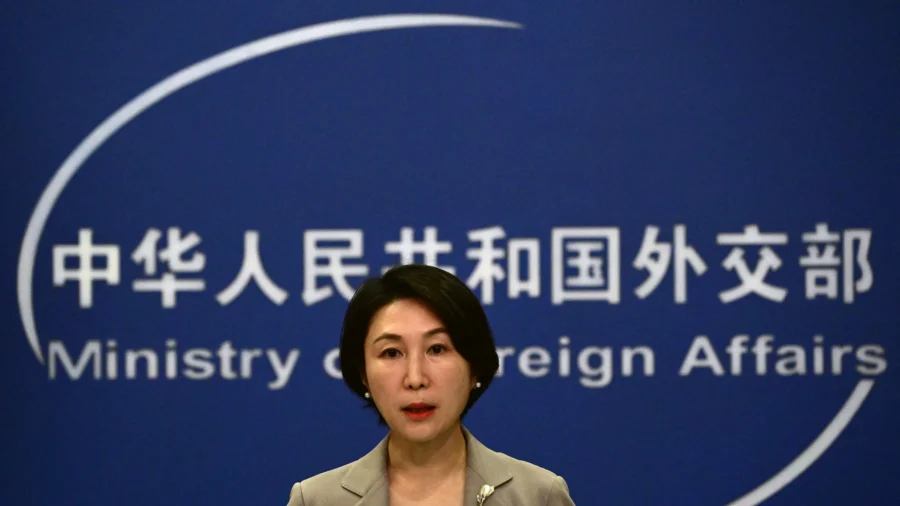China’s communist regime is imposing sanctions on a U.S. research firm and two individuals in response to Washington’s recent moves to pressure Beijing regarding human rights abuses against Uyghur and other Muslim minorities.
The sanctions affect Kharon, a San Francisco-based research and data company; Edmund Xu, a senior researcher who leads the Asia study program at Kharon; and Nicole Morgret, a policy analyst at the U.S.-China Economic and Security Review Commission, a U.S. congressional advisory body, Chinese foreign ministry spokeswoman Mao Ning said at a regular briefing on Dec. 26.
The measures freeze any assets within China owned by Kharon and the two researchers, and block travel to mainland China, Hong Kong, and Macau, Ms. Mao said. Chinese firms and citizens also are barred from working with them, she added.
The spokeswoman described the move as a response to Kharon’s research work related to Xinjiang, the region in far-western China where U.S. authorities, along with other Western governments, said genocide is taking place.
Beijing’s sanctions are “largely symbolic” and have little effect on its business and clients, given that the company has no presence in China, Kharon said.
Kharon noted that Chinese authorities have sanctioned other U.S. businesses, individuals, and organizations over the past several years, the company said in an emailed statement to The Epoch Times.
“In service of our clients and all global businesses that seek to implement leading risk management programs, Kharon will continue to provide research and data analytics that is objective, independent, and based on reliable sources,” it said.
Ms. Morgret has published many reports revealing the regime’s rights abuses in Xinjiang; she couldn’t be reached for comment.
“The Chinese government is undertaking a concerted drive to industrialize the Xinjiang Uyghur Autonomous Region (XUAR), which has led an increasing number of corporations to establish manufacturing operations there,” Ms. Morgret wrote in a study released by the nonprofit Center for Advanced Defense Studies in July 2022. “This centrally-controlled industrial policy is a key tool in the government’s efforts to forcibly assimilate Uyghurs and other Turkic peoples through the institution of a coerced labor regime.”
Beijing has long denied such accusations of abuses. At the Dec. 26 briefing, Ms. Mao accused Washington of spreading “false stories on Xinjiang” and threatened to retaliate.
“If the U.S. refuses to change course, China will not flinch and will respond in kind,” she said.
‘Countermeasure’
The ministry described Beijing’s move as a “countermeasure” to an annual U.S. government report on human rights in Xinjiang, which led to the recent sanctions against three Chinese entities and two officials.
The State Department didn’t respond by press time to a request by The Epoch Times for comment.
The two Chinese officials added to the U.S. sanctions list earlier this month are Hu Lianhe, the vice head of the Xinjiang Work Coordination Small Group of the Central Committee, which has been instrumental in implementing Beijing’s Xinjiang policies, and Gao Qi, the deputy chief of the Yili region’s vice governor and former leader of the local public security bureau.
The United States also restricted imports from three Chinese companies: state-owned COFCO Sugar Holding, Sichuan Jingweida Technology Group, and Anhui Xinya New Materials, which the U.S. government said were working with local authorities to ”recruit, transport, transfer, harbor, or receive forced labor or Uyghurs, Kazakhs, Kyrgyz, or members of other persecuted groups” out of Xinjiang.
The sanctions announced on Dec. 8 were part of a coordinated action with the United Kingdom and Canada targeting 37 individuals in 13 countries to mark International Human Rights Day.
At least 1 million Uyghur and other Muslim minorities are held in internment camps in Xinjiang, where they have been subjected to forced sterilization, torture, political indoctrination, and forced labor, according to numerous reports and research from recent years.
Eva Fu contributed to this report.
From The Epoch Times

